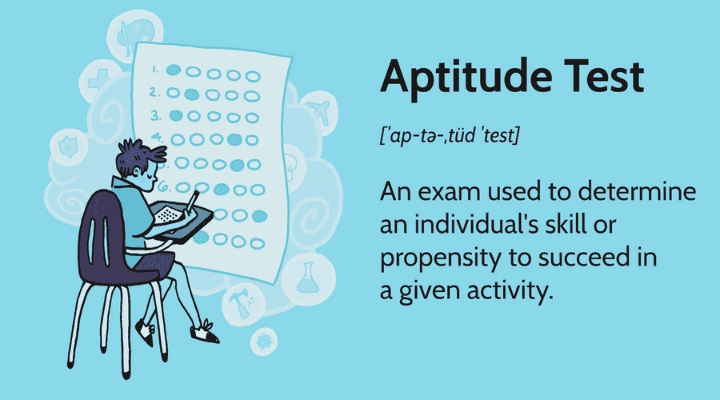A Complete Guide on How to Test Aptitude Skills
Published on January 5th, 2023
How do you test the aptitude of a potential candidate?
Do you make them solve a puzzle or demystify a riddle?
Or do you give them crosswords or make them play some other problem-solving game?
No right?
You would want a trustable source and objective test and assessment to gauge your candidate.
Well, it is your day!
Find out a complete guide on what are aptitude tests and where can you find the best ones to hire the best candidates for your organization.
What are Aptitude Tests?
Aptitude tests are standardized tests that are used to assess a job candidate's abilities and potential in a specific area or for a specific role. They are designed to measure a candidate's natural abilities, such as verbal and numerical reasoning, problem-solving, and spatial awareness, and are often used to evaluate a candidate's suitability for a particular job or profession.
There are several types of aptitude tests for recruiters, including cognitive ability tests, personality tests, and technical skills tests.
What are the Advantages of Aptitude Tests for the Employers?
1. Find the Right Candidates
Aptitude tests can be a useful tool for employers to assess a candidate's abilities and potential for a specific role or job. They can help identify a candidate's strengths and weaknesses, as well as their potential for growth and development. Aptitude tests can also help to identify candidates who may be a good fit for certain roles, even if they do not have direct experience in that field.
However, it's important to note that aptitude tests should not be the sole basis for hiring decisions and should be used in conjunction with other evaluation methods such as interviews and background checks.
2. Objectivity
Aptitude tests provide a more objective way of evaluating candidates, as they are not influenced by factors such as a candidate's personal characteristics or interview performance.
It is challenging to measure human intelligence. However, by employing aptitude tests, recruiters may assess applicants' cognitive abilities and make sure the individual they choose is the best fit for the position.
3. Identifying strengths and weaknesses
Aptitude tests can help employers identify a candidate's strengths and weaknesses, which can be useful in determining the best role for them within the company. Aptitude tests are also useful in assessing the existing employees and carrying out the L&D initiative.
Learning and Development is an important part of organizations these days where they vet their existing candidates and analyze whether they need to be reskilled or upskilled.
4. Potential for growth
Aptitude tests can help employers identify candidates with the potential for growth and development, which can be beneficial for long-term success within the company.
This is another aspect of L&D where the HRs carry out aptitude tests within the organization to find out which employees are excelling at work and have the potential for growth. This also parses below-average candidates and the organization can easily make a decision on whether to retain them or lay them off.
5. Cost-effective
Aptitude tests are generally less time-consuming and less expensive than other forms of evaluation such as on-the-job training or internships.
Since aptitude tests may be administered through remote systems, it is both highly affordable and practical to do so. The requirement for time- and resource-intensive human interaction is further diminished by their scalability and auto-grading characteristics.
6. No Bias
By concentrating on relevant mental abilities, aptitude tests are a standardized method of evaluating candidates and help save time. Due to the results being unaffected by educational and professional experiences, these exams are fair and unbiased. Also, the test findings cannot be manipulated.
It's important to note that aptitude tests should not be the sole basis for hiring decisions and should be used in conjunction with other evaluation methods such as interviews, background checks, and reference checks.
Useful Aptitude Tests for Finding the Best Job Candidates
1. Raven Progressive Matrices Test
The Raven's Progressive Matrices test is a nonverbal aptitude test that is used to measure a person's ability to perceive relationships between visual patterns. The test consists of a series of increasingly complex patterns, and the person taking the test is asked to select the one pattern that completes the series.
Use HireQuotient’s Raven's Progressive Matrices test in conjunction with other aptitude tests and evaluation methods, such as interviews and background checks, to gain a more comprehensive assessment of a candidate's abilities and potential.
It's also important to note that the test is not suitable for people with visual impairments or cognitive disabilities, and alternative methods should be used for these individuals.
2. Analytical Skills Test
An analytical skills test is a type of aptitude test that is used to measure a candidate's ability to analyze information, solve problems, and make decisions. These tests often include scenarios and case studies that require the candidate to analyze data, identify patterns, and make logical conclusions.
Use HireQuotient’s Analytical Skills Test to evaluate your potential candidates for any open job roles at your organization.
3. Numerical Reasoning Test
A numerical reasoning test is a type of aptitude test that measures a candidate's ability to understand and work with numerical data. The test typically includes questions that involve mathematical operations such as addition, subtraction, multiplication, and division, as well as data interpretation, problem-solving, and critical thinking.
Numerical reasoning tests are often used in fields such as finance, accounting, and business, where the ability to work with numerical data is essential. They are also used in other fields such as engineering, science, and technology.
HireQuotient’s Numerical Reasoning Test can be used for evaluating the numerical sanity of your potential candidate and hiring the right one for your business.
4. Critical Thinking Test
A critical thinking test is a type of aptitude test that measures a candidate's ability to analyze information, evaluate evidence, and make logical conclusions. These tests often include scenarios and case studies that require the candidate to evaluate arguments, identify assumptions, and make decisions based on the information provided.
Use HireQuotient’s Critical Thinking Test to gauge your candidate’s critical thinking abilities which is a prerequisite skill for almost all job roles.
5. Logical Reasoning Test
A logical reasoning test is a type of aptitude test that is designed to measure a candidate's ability to think critically and make logical inferences based on the information provided. These tests typically include a series of problems, puzzles or scenarios, that require the candidate to analyze information, identify assumptions, and draw logical conclusions.
The test format can be different, it can be multiple-choice questions, where the candidate is presented with a problem and a set of possible answers, or it can be a written test, where the candidate is presented with a problem and must provide their own solution.
Make use of HireQuotient’s Logical Reasoning Test to analyze your candidate efficiently and effectively.
6. Abstract Reasoning Test
An abstract reasoning test is a type of aptitude test that measures a candidate's ability to understand and analyze abstract concepts and patterns. The test typically includes a series of abstract shapes or figures, and the candidate is asked to identify the logical pattern or rule that governs the relationships between the shapes or figures.
An abstract reasoning test is considered a culture-fair test, meaning it is not influenced by a person's language, educational background, or cultural experiences.
7. Spatial Reasoning Test
The purpose of a spatial reasoning test is to evaluate a candidate's proficiency in working with both two- and three-dimensional spaces. The candidate must envision and draw conclusions from views seen from various sides and angles.
Spatial reasoning tests are often used in a variety of fields such as engineering, architecture, design, and the sciences, where strong spatial reasoning abilities are essential for success. They can also be used in fields such as construction, manufacturing, and transportation.
8. Situational Judgement Test
A situational judgment test (SJT) is a type of aptitude test that measures a candidate's ability to identify and solve problems in a simulated work-related situation. The test typically presents the candidate with a series of hypothetical scenarios or case studies that describe a problem or conflict, and the candidate is asked to choose the most appropriate course of action from a list of options.
Situational judgment tests are often used in a variety of fields such as business, law, healthcare, and education, where strong problem-solving and decision-making abilities are essential for success. They can also be used in fields such as customer service, human resources, and management.
9. Data Interpretation Assessment
Employers utilize data interpretation tests as pre-employment aptitude assessments to gauge candidates' data interpretation skills. It is a method to thoroughly evaluate a candidate's capacity for structuring observations and identifying trends from various data sources.
HireQuotient’s Data Interpretation Assessment typically includes a series of questions or problems that require the candidate to work with charts, graphs, tables or other forms of data, in order to identify patterns, relationships, or trends and draw logical conclusions.
10. Verbal Reasoning Test
One of the most popular psychometric tests used to evaluate a candidate's worth and potential is the verbal reasoning test. HireQuotient’s Verbal reasoning test assesses language skills as well as the candidate’s capacity to infer conclusions and recognize logical underpinnings from the information presented. The verbal reasoning tests can also be used to evaluate a candidate's aptitude for extracting relevant information from long passages and conveying it in a concise manner.
Final Thoughts
If you are a recruiter who is still using physical and manual methods to test your candidate’s aptitude, you need to kick yourself in the head.
The recruitment world is evolving and bending towards pre-employment assessments day by day. It is the right and perfect time to start using these AI-based recruitment tools to skip all the redundant tasks and concentrate on more important tasks.
Visit HireQuotient and book a demo with us today.
Authors

Yash Chaudhari
With a strong background as an SEO and Content Specialist, Yash excels in driving organic traffic, improving search engine rankings, and creating SEO-optimized content. He has a proven track record of implementing strategies that increase website traffic and conversions. Additionally, Yash is an automotive enthusiast and has a keen interest in astronomy.
Hire the best without stress
Ask us how
Never Miss The Updates
We cover all recruitment, talent analytics, L&D, DEI, pre-employment, candidate screening, and hiring tools. Join our force & subscribe now!
Stay On Top Of Everything In HR

